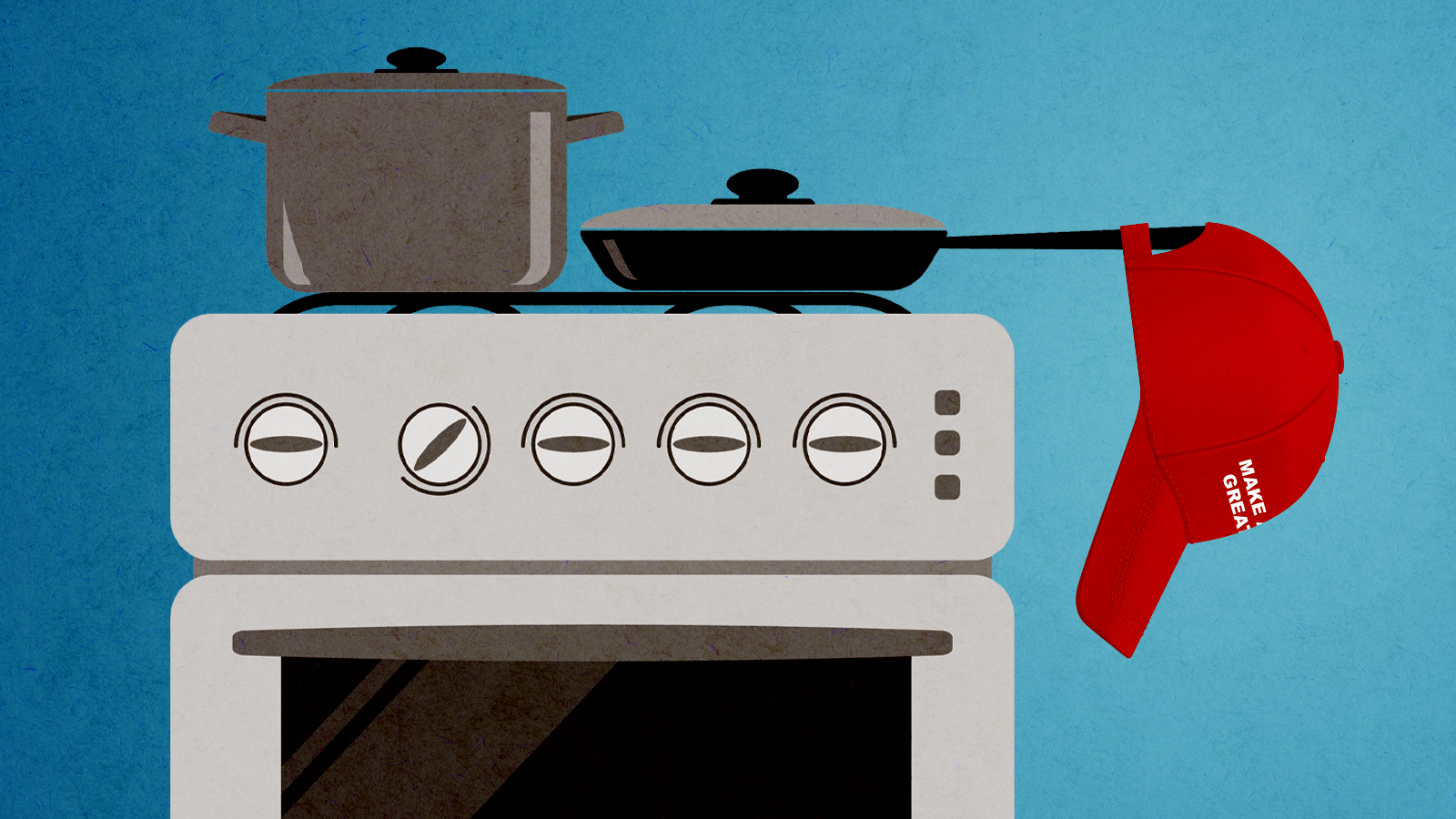The next front in the culture wars: Gas stoves
There's a battle heating up over how we heat our food


A free daily email with the biggest news stories of the day – and the best features from TheWeek.com
You are now subscribed
Your newsletter sign-up was successful
Typically, the phrase "America's culture wars" calls to mind hot-button social issues like LGBTQ rights, immigration, or questions of gun control — the sorts of things that often fall along the country's broad partisan lines. What the phrase is less likely to invoke, however, is a question of what type of kitchen appliance a person has in their home. At least, that was largely the case until this week, when Consumer Product Safety Commission member Richard Trumka Jr. told Bloomberg that his panel was looking into new research that shows gas stoves are a significant source of childhood asthma, as well as assessing the various environmental dangers traced back to the common kitchen appliance. As to what the CPSC might actually do to mitigate those health risks, Trumka was circumspect, saying merely that "any option is on the table," adding that "products that can't be made safe can be banned."
A government agency tasked with protecting consumers announcing that it is exploring ways to protect consumers from a demonstrable health risk is usually not all that noteworthy. However, news of the potential for federal action against gas stoves — the sort found in an estimated 40 million homes, according to a group of lawmakers who last month urged the CSPC to look into the matter — was enough to propel the appliances to the culture war frontlines, with elected officials from both sides of the aisle falling back on conspicuously martial language in their efforts to defend Americans' freedom to pump their kitchens full of gas. Here's everything you need to know:
What are lawmakers saying about gas stoves?
What followed Trumka's comments was a conservative media feeding frenzy and hyperbolic reactions from (mostly) Republican lawmakers, then reactions to those reactions, and so on. Somewhat surprisingly, the full-throated pushback to the theoretical prospect of federal action to mitigate documented health risks echoed the rhetoric and intensity around Second Amendment rights.
The Week
Escape your echo chamber. Get the facts behind the news, plus analysis from multiple perspectives.

Sign up for The Week's Free Newsletters
From our morning news briefing to a weekly Good News Newsletter, get the best of The Week delivered directly to your inbox.
From our morning news briefing to a weekly Good News Newsletter, get the best of The Week delivered directly to your inbox.
Even conservative Democratic Sen. Joe Manchin of West Virginia seemed outright incensed.
In response to Rep. Ronny Jackson's (R-Texas) application of former NRA president Charlton Heston's now-infamous "from my cold dead hands" remarks to kitchen appliances, rather than firearms, Rep. Alexandria Ocasio-Cortez (D-N.Y.) wryly pointed out that research has shown a possible link between gas stoves and cognitive impairment.
Trumka himself also weighed in on the backlash, assuring Rep. Gary Palmer (R-Ala.) that "CPSC isn't coming for anyone's gas stoves," and any forthcoming regulations would only apply to "new products."
Will the strong reactions really matter?
On a certain level, no, not really. To date, no one has actually banned, or even placed restrictions, on anyone's gas stoves. In a letter to the CSPC last month, a group of Democratic lawmakers requested a fairly anodyne list of ways the commission could address the health risks posed by gas stoves, including:
A free daily email with the biggest news stories of the day – and the best features from TheWeek.com
- Require gas stoves to be sold with range hoods that meet mandatory performance standards, assessing their efficiency in removing pollutants.
- Where feasible, issue mandatory performance standards for gas stoves that address leakage, including requiring automatic shut-off valves.
- Where feasible, issue mandatory performance standards for gas stoves that address the health effects of hazardous emissions.
- Require labels on gas stoves that educate consumers about their exposure risks.
- Launch a public education campaign on the health risks of cooking with a gas stove and the steps consumers can take to minimize their risks.
Warnings, labels, and uniform performance standards are fairly expected consumer protection actions overall. What was less expected was the supercharged, gun-tinged reaction from Republican lawmakers who quickly positioned stoves as an issue of populist freedoms over governmental overreach. Similar consumer protection actions in the past faced resistance from discrete trade groups whose business was poised to be affected, and even those — like seatbelt laws — which did rouse widespread backlash from the public at large were argued in decidedly less hyperbolic terms.
Why does this seem vaguely familiar?
Conservatives have increasingly leaned on this type of all-or-nothing rhetoric in recent years, particularly in Texas, where the "Come and Take It" slogan is historically infused into the state's general sense of self. There, lawmakers have used the phrase — and the implied threat thereof — to defend everything from limiting bathroom access for the transgender community to cooking turkey:
On the one hand, the drama of equating Second Amendment rhetoric with turkeys and kitchen appliances affords lawmakers the excuse of simply being silly online. At the same time, as Foreign Policy lays out, it can also flatten any subject into the overly simplified "you're either with us or against us" paradigm that has largely come to define the country's culture wars in recent years.
In his interview with Bloomberg, Trumka predicted that the CSPC would allow for public input on any gas stove regulatory moves comment sometime this winter. It seems, however, that the tone and tenor of one side of that forthcoming debate have already been decided.
Rafi Schwartz has worked as a politics writer at The Week since 2022, where he covers elections, Congress and the White House. He was previously a contributing writer with Mic focusing largely on politics, a senior writer with Splinter News, a staff writer for Fusion's news lab, and the managing editor of Heeb Magazine, a Jewish life and culture publication. Rafi's work has appeared in Rolling Stone, GOOD and The Forward, among others.
-
 What to know before filing your own taxes for the first time
What to know before filing your own taxes for the first timethe explainer Tackle this financial milestone with confidence
-
 The biggest box office flops of the 21st century
The biggest box office flops of the 21st centuryin depth Unnecessary remakes and turgid, expensive CGI-fests highlight this list of these most notorious box-office losers
-
 The 10 most infamous abductions in modern history
The 10 most infamous abductions in modern historyin depth The taking of Savannah Guthrie’s mother, Nancy, is the latest in a long string of high-profile kidnappings
-
 Grand jury rejects charging 6 Democrats for ‘orders’ video
Grand jury rejects charging 6 Democrats for ‘orders’ videoSpeed Read The jury refused to indict Democratic lawmakers for a video in which they urged military members to resist illegal orders
-
 Democrats push for ICE accountability
Democrats push for ICE accountabilityFeature U.S. citizens shot and violently detained by immigration agents testify at Capitol Hill hearing
-
 Will Peter Mandelson and Andrew testify to US Congress?
Will Peter Mandelson and Andrew testify to US Congress?Today's Big Question Could political pressure overcome legal obstacles and force either man to give evidence over their relationship with Jeffrey Epstein?
-
 Rep. Ilhan Omar attacked with unknown liquid
Rep. Ilhan Omar attacked with unknown liquidSpeed Read This ‘small agitator isn’t going to intimidate me from doing my work’
-
 Can anyone stop Donald Trump?
Can anyone stop Donald Trump?Today's Big Question US president ‘no longer cares what anybody thinks’ so how to counter his global strongman stance?
-
 Will the new year bring a new shutdown?
Will the new year bring a new shutdown?Today’s Big Question A January deadline could bring the pain all over again
-
 Is Trump deliberately redacting Epstein files to shield himself?
Is Trump deliberately redacting Epstein files to shield himself?Today’s Big Question Removal of image from publicly released documents prompts accusations of political interference by justice department
-
 Could Trump run for a third term?
Could Trump run for a third term?The Explainer Constitutional amendment limits US presidents to two terms, but Trump diehards claim there is a loophole
